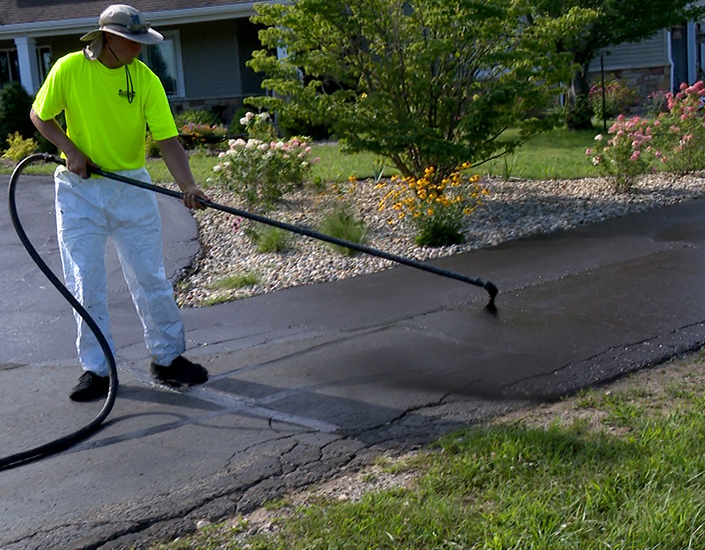Maximize Financial Investment Returns: Angled Parking Area Excellence with Asphalt Sealing
Hot Mix Asphalt: A Sustainable Solution for Pavement
Warm Mix Asphalt (HMA) has arised as a leading sustainable choice for pavement remedies, using a myriad of ingenious modern technologies and ecological advantages. Its ability to decrease and reuse materials energy intake offers an engaging situation for its adoption in road building and construction tasks. The long-term performance and resilience of HMA make it a preferred option for framework advancement. As the need for green building techniques grows, exploring the nuances of HMA's sustainability can provide beneficial insights right into the future of sidewalk options.
Ecological Advantages of Hot Mix Asphalt

Additionally, Hot Mix Asphalt helps to alleviate city heat island results. Its dark shade soaks up sunlight, reducing the quantity of warm reflected back right into the atmosphere contrasted to lighter-colored sidewalks. This can lower ambient temperature levels in urban locations, decreasing the need for air conditioning and inevitably minimizing power usage.
In enhancement, Hot Mix Asphalt adds to enhanced stormwater administration. Its porous nature enables water to charge and penetrate the pavement groundwater products, decreasing drainage and the risk of flooding. These environmental advantages make Hot Mix Asphalt a sustainable choice for paving roadways and freeways.
Energy Effectiveness in HMA Manufacturing
Is power performance an important factor in the production of Warm Mix Asphalt (HMA)? Energy plays a substantial function in the production of HMA, influencing both cost and environmental sustainability. One essential facet of power performance in HMA manufacturing is the usage of cozy mix asphalt (WMA) innovations.
In addition, improvements in plant modern technologies have resulted in more energy-efficient HMA manufacturing procedures. Modern plants are made with functions like recycled asphalt sidewalk (RAP) processing capacities, effective burner systems, and improved insulation, all adding to power cost savings. By enhancing power usage in HMA production, the sector can decrease its carbon footprint while keeping premium pavement materials. Energy performance is, therefore, an essential factor to consider in making certain the sustainability of Hot Mix Asphalt production.
Recyclability of Warm Mix Asphalt
The recyclability of Hot Mix Asphalt (HMA) is a critical facet of its sustainability and long-term ecological effect. HMA is one of one of the most recycled products in the USA, with over 100 million lots of reclaimed asphalt sidewalk (RAP) being recycled every year in brand-new sidewalk building. Reusing HMA supplies numerous environmental benefits, such as decreasing the requirement for virgin products, decreasing energy usage during production, and reducing the amount of waste sent out to landfills.
The process of recycling HMA includes milling the existing sidewalk, crushing it into smaller sized items, and blending it with brand-new aggregate and asphalt his response binder to create a recycled mix. This recycled mix can commonly do as well as or perhaps far better than standard HMA, while requiring less resources and generating lower greenhouse gas discharges. By integrating RAP into new pavement projects, roadway firms can conserve natural sources, reduce prices, and minimize the environmental footprint of roadway building and construction and upkeep activities. Overall, the recyclability of HMA plays a considerable duty in promoting lasting practices within the pavement industry.

Long-Term Efficiency of HMA
Asphalt pavements demonstrate longevity and durability over a prolonged duration, showing the long-term performance of Warm Mix Asphalt (HMA) Furthermore, improvements in HMA modern technology, such as the use of polymer-modified binders and warm mix asphalt, have further improved the longevity and durability of HMA sidewalks. By focusing on top quality construction and maintenance methods, HMA proceeds to prove itself as a cost-efficient and lasting service for long-lasting sidewalk facilities.
.png)
HMA: Toughness and Sustainability
Showing both longevity and sustainability, Hot Mix Asphalt (HMA) has actually ended up being a foundation in the building and construction of long-lasting pavement frameworks - hot mix asphalt. HMA's resilience stems from its capability to hold up against heavy loads, harsh weather, and high traffic volumes, making it a trusted selection for roadways, freeways, and airport paths. The make-up of HMA, which normally includes aggregates, binder, and filler, plays a crucial duty in enhancing its longevity and resistance to deterioration
Furthermore, HMA's sustainability lies in its recyclability and energy-efficient page manufacturing process. The capability to recycle reclaimed asphalt pavement (RAP) in brand-new HMA blends reduces the demand for virgin products and decreases the environmental effect of pavement building and construction and maintenance. Furthermore, the power performance of producing HMA depends on its reduced mixing temperatures contrasted to various other sidewalk products, leading to lowered energy intake and greenhouse gas emissions.
Conclusion
To conclude, warm mix asphalt (HMA) provides a sustainable option for sidewalk with its eco pleasant characteristics. HMA's recyclability, energy efficiency in production, and long-term toughness make it an environmentally friendly option for road building. By saving natural deposits, lowering waste, and lowering greenhouse gas emissions, HMA plays a critical function in promoting sustainability in framework development. Its ability to mitigate urban heat island results better emphasizes its significance in producing eco aware and durable sidewalk systems.
HMA is one of the most recycled materials in the United States, with over 100 million lots of redeemed asphalt sidewalk (RAP) being recycled yearly in brand-new sidewalk building and construction.The procedure of recycling HMA entails milling the existing sidewalk, crushing it into smaller pieces, and mixing it with brand-new accumulation and asphalt visit homepage binder to create a recycled mix.Asphalt sidewalks show toughness and strength over an extensive period, showing the lasting performance of Warm Mix Asphalt (HMA) Additionally, improvements in HMA innovation, such as the usage of polymer-modified binders and cozy mix asphalt, have further boosted the longevity and long life of HMA sidewalks. The capability to reuse redeemed asphalt sidewalk (RAP) in new HMA blends lowers the demand for virgin materials and decreases the environmental impact of pavement building and upkeep.